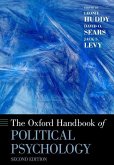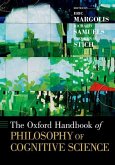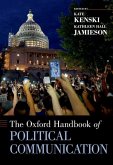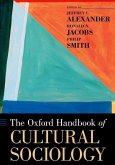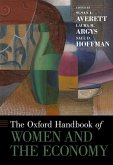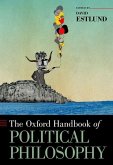Patricia Leavy (Independent Researcher Independent Researcher)
The Oxford Handbook of Qualitative Research
Patricia Leavy (Independent Researcher Independent Researcher)
The Oxford Handbook of Qualitative Research
- Gebundenes Buch
- Merkliste
- Auf die Merkliste
- Bewerten Bewerten
- Teilen
- Produkt teilen
- Produkterinnerung
- Produkterinnerung
The Oxford Handbook of Qualitative Research, Second Edition presents a comprehensive, interdisciplinary overview of the field of qualitative research. Divided into eight parts, the forty chapters address key topics in the field such as approaches to qualitative research (philosophical perspectives), narrative inquiry, field research, and interview methods, text, arts-based, and internet methods, analysis and interpretation of findings, and representation and evaluation. The handbook is intended for students of all levels, faculty, and researchers across the disciplines, with a contributor list…mehr
Andere Kunden interessierten sich auch für
![The Oxford Handbook of Political Psychology The Oxford Handbook of Political Psychology]() The Oxford Handbook of Political Psychology71,99 €
The Oxford Handbook of Political Psychology71,99 €![The Oxford Handbook of Philosophy of Cognitive Science The Oxford Handbook of Philosophy of Cognitive Science]() The Oxford Handbook of Philosophy of Cognitive Science63,99 €
The Oxford Handbook of Philosophy of Cognitive Science63,99 €![The Oxford Handbook of Political Communication The Oxford Handbook of Political Communication]() The Oxford Handbook of Political Communication78,99 €
The Oxford Handbook of Political Communication78,99 €![The Oxford Handbook of Cultural Sociology The Oxford Handbook of Cultural Sociology]() The Oxford Handbook of Cultural Sociology73,99 €
The Oxford Handbook of Cultural Sociology73,99 €![The Oxford Handbook of Gossip and Reputation The Oxford Handbook of Gossip and Reputation]() The Oxford Handbook of Gossip and Reputation227,99 €
The Oxford Handbook of Gossip and Reputation227,99 €![Oxford Handbook of Women and the Economy Oxford Handbook of Women and the Economy]() Oxford Handbook of Women and the Economy209,99 €
Oxford Handbook of Women and the Economy209,99 €![The Oxford Handbook of Political Philosophy The Oxford Handbook of Political Philosophy]() The Oxford Handbook of Political Philosophy62,99 €
The Oxford Handbook of Political Philosophy62,99 €-
-
-
The Oxford Handbook of Qualitative Research, Second Edition presents a comprehensive, interdisciplinary overview of the field of qualitative research. Divided into eight parts, the forty chapters address key topics in the field such as approaches to qualitative research (philosophical perspectives), narrative inquiry, field research, and interview methods, text, arts-based, and internet methods, analysis and interpretation of findings, and representation and evaluation. The handbook is intended for students of all levels, faculty, and researchers across the disciplines, with a contributor list that represents some of the most influential and innovative researchers as well as emerging scholars.
Hinweis: Dieser Artikel kann nur an eine deutsche Lieferadresse ausgeliefert werden.
Hinweis: Dieser Artikel kann nur an eine deutsche Lieferadresse ausgeliefert werden.
Produktdetails
- Produktdetails
- Oxford Handbooks
- Verlag: Oxford University Press Inc
- 2 Revised edition
- Seitenzahl: 1280
- Erscheinungstermin: 21. August 2020
- Englisch
- Abmessung: 249mm x 173mm x 58mm
- Gewicht: 2264g
- ISBN-13: 9780190847388
- ISBN-10: 0190847387
- Artikelnr.: 58342616
- Herstellerkennzeichnung
- Produktsicherheitsverantwortliche/r
- Europaallee 1
- 36244 Bad Hersfeld
- gpsr@libri.de
- Oxford Handbooks
- Verlag: Oxford University Press Inc
- 2 Revised edition
- Seitenzahl: 1280
- Erscheinungstermin: 21. August 2020
- Englisch
- Abmessung: 249mm x 173mm x 58mm
- Gewicht: 2264g
- ISBN-13: 9780190847388
- ISBN-10: 0190847387
- Artikelnr.: 58342616
- Herstellerkennzeichnung
- Produktsicherheitsverantwortliche/r
- Europaallee 1
- 36244 Bad Hersfeld
- gpsr@libri.de
Patricia Leavy, PhD, is a leading researcher, acclaimed author, and public speaker. She has published more than twenty-five books, including Research Design: Quantitative, Qualitative, Mixed Methods, Arts-Based, and Community-Based Participatory Research Approaches, Handbook of Arts-Based Research, Method Meets Art, The Oxford Handbook of Methods for Public Scholarship, and the novels Spark, Blue, American Circumstance, and Low-Fat Love. She is also series creator and editor for eight book series with Oxford University Press and Brill-Sense, including the ground-breaking Social Fictions series. She has blogged for The Creativity Post, The Huffington Post, Mogul, and We Are the Real Deal and is cofounder and co-editor-in-chief of Art/Research International: A Transdisciplinary Journal. She has received career awards from the New England Sociological Association, the American Creativity Association, the American Educational Research Association, the National Art Education Association, and the International Congress of Qualitative Inquiry, and the State University of New York at New Paltz has established the "Patricia Leavy Award for Art and Social Justice."
* Preface
* 1. Introduction by the Editor: Patricia Leavy
* Part One: The Qualitative Tradition
* 2. Historical Overview of Qualitative Research in the Social
Sciences: Svend Brinkmann, Michael Hviid Jacobsen, and Søren
Kristiansen
* 3. The History of Historical-Comparative Methods in Sociology: Chares
Demetriou and Victor Roudometof
* 4. The Centrality of Ethics in Qualitative Research: Anna Traianou
* Part Two: Approaches to Qualitative Research
* 5. Philosophical Approaches to Qualitative Research: Renée Spencer,
Julia M. Pryce, and Jill Walsh
* 6. Applied Interpretive Approaches: Sally E.Thorne
* 7. The Grounded Theory Method: Antony Bryant
* 8. Feminist Qualitative Research: Toward Transformation of Science
and Social Justice: Maureen C. McHugh
* 9. Critical Approaches to Qualitative Research: Kum-Kum Bhavnani,
Peter Chua, and Dana Collins
* 10. Decolonizing Research Practice: Indigenous Methodologies,
Aboriginal Methods, and Knowledge/Knowing: Mike Evans, Adrian Miller,
Peter Hutchinson, and Carlene Dingwall
* Part Three: Narrative Inquiry, Field Research, and Interview Methods
* 11. Practicing Narrative Inquiry II: Making Meanings Move: Arthur P.
Bochnerand Andrew F. Herrmann
* 12. Ethnography: Anthony Kwame Harrison
* 13. Practicing Autoethnograhy and Living the Autoethnographic Life:
Carolyn Ellis and Tony E. Adams
* 14. Duoethnography: A Polytheoretical Approach to (Re)Storing,
(Re)Storying the Meanings that One Give: Joe Norris and Rick Sawyer
* 15. Unstructured and Semi-Structured Interviewing: Svend Brinkmann
* 16. Oral History Interviewing: With Purpose and Critical Awareness:
Valerie J. Janesick
* 17. Focus Group Research: Retrospect and Prospect: George Kamberelis
and Greg Dimitriadis
* 18. Museum Studies: Erica L. Tucker
* Part Four: Text, Arts-Based, and Internet Methods
* 19. Content Analysis: Lindsay Prior
* 20. Photography as a Research Method: Gunilla Holm
* 21. Arts-Based Research Practice: Merging Social Research and the
Creative Arts: Gioia Chilton and Patricia Leavy
* 22. Qualitative Approaches in Internet-Mediated Research:
Opportunities, Issues, Possibilities: Claire Hewson
* Part Five: Multi-Method, Mixed Methods, and Participatory Designs
* 23. Case Study Research: In-Depth Understanding in Context: Helen
Simons
* 24. Program Evaluation: Paul R.Brandon and Anna L. Ah Sam
* 25. Community-Based Research: A Grass-Roots and Social Justice
Orientation to Inquiry: Margaret Boyd
* 26. Complex Teams and Qualitative Research: Judith Davidson
* 27. Qualitative Disaster Research: DeeDee M. Bennett, Mark R.
Landahl, Brenda D.Phillips
* 28. Conducting Mixed Methods Research: Using Dialectical Pluralism
and Social Psychological Strategies: Susan A. Tucker, R. Burke
Johnson, Tony Onwuegbuzie, and Marjorie L. Icenogle
* Part Six: Analysis and Interpretation
* 29. Qualitative Data Analysis Strategies: Johnny Saldaña
* 30. Computer-Assisted Analysis of Qualitative Research: Christina
Silver and Ann F. Lewins
* 31. Interpretation Strategies in Qualitative Research: What, Why,
How: Allen Trent and Jeasik Cho
* Part Seven: Representation and Evaluation
* 32. Writing Up Qualitative Research: Jane F.Gilgun
* 33. Transforming Field Notes into Text: Jessica Smartt Gullion
* 34. Creative Approaches to Writing: Sandra L. Faulkner and Sheila
Squillante
* 35. Scripting Ethnodrama: Joe Salvatore
* 36. Write-Reach-Repeat: The Role and Rise of Public Intellectualism
in Qualitative Research: Robin M. Boylorn
* 37. Evaluating Qualitative Research 2.0: Jeasik Cho and Allen Trent
* Part Eight: Conclusion: Politics, Pedagogy, and the Public
* 38. The Politics of Research: Michael D. Giardina and Joshua I.
Newman
* 39. Superheroes and Superpowers: Contemplative, Creative, and
De/Colonial Approaches to Teaching Qualitative Research: Kakali
Bhattacharya
* 40. A Changing Terrain: Qualitative Research in the Age of
Transdisciplinarity and Public Scholarship: Patricia Leavy
* 1. Introduction by the Editor: Patricia Leavy
* Part One: The Qualitative Tradition
* 2. Historical Overview of Qualitative Research in the Social
Sciences: Svend Brinkmann, Michael Hviid Jacobsen, and Søren
Kristiansen
* 3. The History of Historical-Comparative Methods in Sociology: Chares
Demetriou and Victor Roudometof
* 4. The Centrality of Ethics in Qualitative Research: Anna Traianou
* Part Two: Approaches to Qualitative Research
* 5. Philosophical Approaches to Qualitative Research: Renée Spencer,
Julia M. Pryce, and Jill Walsh
* 6. Applied Interpretive Approaches: Sally E.Thorne
* 7. The Grounded Theory Method: Antony Bryant
* 8. Feminist Qualitative Research: Toward Transformation of Science
and Social Justice: Maureen C. McHugh
* 9. Critical Approaches to Qualitative Research: Kum-Kum Bhavnani,
Peter Chua, and Dana Collins
* 10. Decolonizing Research Practice: Indigenous Methodologies,
Aboriginal Methods, and Knowledge/Knowing: Mike Evans, Adrian Miller,
Peter Hutchinson, and Carlene Dingwall
* Part Three: Narrative Inquiry, Field Research, and Interview Methods
* 11. Practicing Narrative Inquiry II: Making Meanings Move: Arthur P.
Bochnerand Andrew F. Herrmann
* 12. Ethnography: Anthony Kwame Harrison
* 13. Practicing Autoethnograhy and Living the Autoethnographic Life:
Carolyn Ellis and Tony E. Adams
* 14. Duoethnography: A Polytheoretical Approach to (Re)Storing,
(Re)Storying the Meanings that One Give: Joe Norris and Rick Sawyer
* 15. Unstructured and Semi-Structured Interviewing: Svend Brinkmann
* 16. Oral History Interviewing: With Purpose and Critical Awareness:
Valerie J. Janesick
* 17. Focus Group Research: Retrospect and Prospect: George Kamberelis
and Greg Dimitriadis
* 18. Museum Studies: Erica L. Tucker
* Part Four: Text, Arts-Based, and Internet Methods
* 19. Content Analysis: Lindsay Prior
* 20. Photography as a Research Method: Gunilla Holm
* 21. Arts-Based Research Practice: Merging Social Research and the
Creative Arts: Gioia Chilton and Patricia Leavy
* 22. Qualitative Approaches in Internet-Mediated Research:
Opportunities, Issues, Possibilities: Claire Hewson
* Part Five: Multi-Method, Mixed Methods, and Participatory Designs
* 23. Case Study Research: In-Depth Understanding in Context: Helen
Simons
* 24. Program Evaluation: Paul R.Brandon and Anna L. Ah Sam
* 25. Community-Based Research: A Grass-Roots and Social Justice
Orientation to Inquiry: Margaret Boyd
* 26. Complex Teams and Qualitative Research: Judith Davidson
* 27. Qualitative Disaster Research: DeeDee M. Bennett, Mark R.
Landahl, Brenda D.Phillips
* 28. Conducting Mixed Methods Research: Using Dialectical Pluralism
and Social Psychological Strategies: Susan A. Tucker, R. Burke
Johnson, Tony Onwuegbuzie, and Marjorie L. Icenogle
* Part Six: Analysis and Interpretation
* 29. Qualitative Data Analysis Strategies: Johnny Saldaña
* 30. Computer-Assisted Analysis of Qualitative Research: Christina
Silver and Ann F. Lewins
* 31. Interpretation Strategies in Qualitative Research: What, Why,
How: Allen Trent and Jeasik Cho
* Part Seven: Representation and Evaluation
* 32. Writing Up Qualitative Research: Jane F.Gilgun
* 33. Transforming Field Notes into Text: Jessica Smartt Gullion
* 34. Creative Approaches to Writing: Sandra L. Faulkner and Sheila
Squillante
* 35. Scripting Ethnodrama: Joe Salvatore
* 36. Write-Reach-Repeat: The Role and Rise of Public Intellectualism
in Qualitative Research: Robin M. Boylorn
* 37. Evaluating Qualitative Research 2.0: Jeasik Cho and Allen Trent
* Part Eight: Conclusion: Politics, Pedagogy, and the Public
* 38. The Politics of Research: Michael D. Giardina and Joshua I.
Newman
* 39. Superheroes and Superpowers: Contemplative, Creative, and
De/Colonial Approaches to Teaching Qualitative Research: Kakali
Bhattacharya
* 40. A Changing Terrain: Qualitative Research in the Age of
Transdisciplinarity and Public Scholarship: Patricia Leavy
* Preface
* 1. Introduction by the Editor: Patricia Leavy
* Part One: The Qualitative Tradition
* 2. Historical Overview of Qualitative Research in the Social
Sciences: Svend Brinkmann, Michael Hviid Jacobsen, and Søren
Kristiansen
* 3. The History of Historical-Comparative Methods in Sociology: Chares
Demetriou and Victor Roudometof
* 4. The Centrality of Ethics in Qualitative Research: Anna Traianou
* Part Two: Approaches to Qualitative Research
* 5. Philosophical Approaches to Qualitative Research: Renée Spencer,
Julia M. Pryce, and Jill Walsh
* 6. Applied Interpretive Approaches: Sally E.Thorne
* 7. The Grounded Theory Method: Antony Bryant
* 8. Feminist Qualitative Research: Toward Transformation of Science
and Social Justice: Maureen C. McHugh
* 9. Critical Approaches to Qualitative Research: Kum-Kum Bhavnani,
Peter Chua, and Dana Collins
* 10. Decolonizing Research Practice: Indigenous Methodologies,
Aboriginal Methods, and Knowledge/Knowing: Mike Evans, Adrian Miller,
Peter Hutchinson, and Carlene Dingwall
* Part Three: Narrative Inquiry, Field Research, and Interview Methods
* 11. Practicing Narrative Inquiry II: Making Meanings Move: Arthur P.
Bochnerand Andrew F. Herrmann
* 12. Ethnography: Anthony Kwame Harrison
* 13. Practicing Autoethnograhy and Living the Autoethnographic Life:
Carolyn Ellis and Tony E. Adams
* 14. Duoethnography: A Polytheoretical Approach to (Re)Storing,
(Re)Storying the Meanings that One Give: Joe Norris and Rick Sawyer
* 15. Unstructured and Semi-Structured Interviewing: Svend Brinkmann
* 16. Oral History Interviewing: With Purpose and Critical Awareness:
Valerie J. Janesick
* 17. Focus Group Research: Retrospect and Prospect: George Kamberelis
and Greg Dimitriadis
* 18. Museum Studies: Erica L. Tucker
* Part Four: Text, Arts-Based, and Internet Methods
* 19. Content Analysis: Lindsay Prior
* 20. Photography as a Research Method: Gunilla Holm
* 21. Arts-Based Research Practice: Merging Social Research and the
Creative Arts: Gioia Chilton and Patricia Leavy
* 22. Qualitative Approaches in Internet-Mediated Research:
Opportunities, Issues, Possibilities: Claire Hewson
* Part Five: Multi-Method, Mixed Methods, and Participatory Designs
* 23. Case Study Research: In-Depth Understanding in Context: Helen
Simons
* 24. Program Evaluation: Paul R.Brandon and Anna L. Ah Sam
* 25. Community-Based Research: A Grass-Roots and Social Justice
Orientation to Inquiry: Margaret Boyd
* 26. Complex Teams and Qualitative Research: Judith Davidson
* 27. Qualitative Disaster Research: DeeDee M. Bennett, Mark R.
Landahl, Brenda D.Phillips
* 28. Conducting Mixed Methods Research: Using Dialectical Pluralism
and Social Psychological Strategies: Susan A. Tucker, R. Burke
Johnson, Tony Onwuegbuzie, and Marjorie L. Icenogle
* Part Six: Analysis and Interpretation
* 29. Qualitative Data Analysis Strategies: Johnny Saldaña
* 30. Computer-Assisted Analysis of Qualitative Research: Christina
Silver and Ann F. Lewins
* 31. Interpretation Strategies in Qualitative Research: What, Why,
How: Allen Trent and Jeasik Cho
* Part Seven: Representation and Evaluation
* 32. Writing Up Qualitative Research: Jane F.Gilgun
* 33. Transforming Field Notes into Text: Jessica Smartt Gullion
* 34. Creative Approaches to Writing: Sandra L. Faulkner and Sheila
Squillante
* 35. Scripting Ethnodrama: Joe Salvatore
* 36. Write-Reach-Repeat: The Role and Rise of Public Intellectualism
in Qualitative Research: Robin M. Boylorn
* 37. Evaluating Qualitative Research 2.0: Jeasik Cho and Allen Trent
* Part Eight: Conclusion: Politics, Pedagogy, and the Public
* 38. The Politics of Research: Michael D. Giardina and Joshua I.
Newman
* 39. Superheroes and Superpowers: Contemplative, Creative, and
De/Colonial Approaches to Teaching Qualitative Research: Kakali
Bhattacharya
* 40. A Changing Terrain: Qualitative Research in the Age of
Transdisciplinarity and Public Scholarship: Patricia Leavy
* 1. Introduction by the Editor: Patricia Leavy
* Part One: The Qualitative Tradition
* 2. Historical Overview of Qualitative Research in the Social
Sciences: Svend Brinkmann, Michael Hviid Jacobsen, and Søren
Kristiansen
* 3. The History of Historical-Comparative Methods in Sociology: Chares
Demetriou and Victor Roudometof
* 4. The Centrality of Ethics in Qualitative Research: Anna Traianou
* Part Two: Approaches to Qualitative Research
* 5. Philosophical Approaches to Qualitative Research: Renée Spencer,
Julia M. Pryce, and Jill Walsh
* 6. Applied Interpretive Approaches: Sally E.Thorne
* 7. The Grounded Theory Method: Antony Bryant
* 8. Feminist Qualitative Research: Toward Transformation of Science
and Social Justice: Maureen C. McHugh
* 9. Critical Approaches to Qualitative Research: Kum-Kum Bhavnani,
Peter Chua, and Dana Collins
* 10. Decolonizing Research Practice: Indigenous Methodologies,
Aboriginal Methods, and Knowledge/Knowing: Mike Evans, Adrian Miller,
Peter Hutchinson, and Carlene Dingwall
* Part Three: Narrative Inquiry, Field Research, and Interview Methods
* 11. Practicing Narrative Inquiry II: Making Meanings Move: Arthur P.
Bochnerand Andrew F. Herrmann
* 12. Ethnography: Anthony Kwame Harrison
* 13. Practicing Autoethnograhy and Living the Autoethnographic Life:
Carolyn Ellis and Tony E. Adams
* 14. Duoethnography: A Polytheoretical Approach to (Re)Storing,
(Re)Storying the Meanings that One Give: Joe Norris and Rick Sawyer
* 15. Unstructured and Semi-Structured Interviewing: Svend Brinkmann
* 16. Oral History Interviewing: With Purpose and Critical Awareness:
Valerie J. Janesick
* 17. Focus Group Research: Retrospect and Prospect: George Kamberelis
and Greg Dimitriadis
* 18. Museum Studies: Erica L. Tucker
* Part Four: Text, Arts-Based, and Internet Methods
* 19. Content Analysis: Lindsay Prior
* 20. Photography as a Research Method: Gunilla Holm
* 21. Arts-Based Research Practice: Merging Social Research and the
Creative Arts: Gioia Chilton and Patricia Leavy
* 22. Qualitative Approaches in Internet-Mediated Research:
Opportunities, Issues, Possibilities: Claire Hewson
* Part Five: Multi-Method, Mixed Methods, and Participatory Designs
* 23. Case Study Research: In-Depth Understanding in Context: Helen
Simons
* 24. Program Evaluation: Paul R.Brandon and Anna L. Ah Sam
* 25. Community-Based Research: A Grass-Roots and Social Justice
Orientation to Inquiry: Margaret Boyd
* 26. Complex Teams and Qualitative Research: Judith Davidson
* 27. Qualitative Disaster Research: DeeDee M. Bennett, Mark R.
Landahl, Brenda D.Phillips
* 28. Conducting Mixed Methods Research: Using Dialectical Pluralism
and Social Psychological Strategies: Susan A. Tucker, R. Burke
Johnson, Tony Onwuegbuzie, and Marjorie L. Icenogle
* Part Six: Analysis and Interpretation
* 29. Qualitative Data Analysis Strategies: Johnny Saldaña
* 30. Computer-Assisted Analysis of Qualitative Research: Christina
Silver and Ann F. Lewins
* 31. Interpretation Strategies in Qualitative Research: What, Why,
How: Allen Trent and Jeasik Cho
* Part Seven: Representation and Evaluation
* 32. Writing Up Qualitative Research: Jane F.Gilgun
* 33. Transforming Field Notes into Text: Jessica Smartt Gullion
* 34. Creative Approaches to Writing: Sandra L. Faulkner and Sheila
Squillante
* 35. Scripting Ethnodrama: Joe Salvatore
* 36. Write-Reach-Repeat: The Role and Rise of Public Intellectualism
in Qualitative Research: Robin M. Boylorn
* 37. Evaluating Qualitative Research 2.0: Jeasik Cho and Allen Trent
* Part Eight: Conclusion: Politics, Pedagogy, and the Public
* 38. The Politics of Research: Michael D. Giardina and Joshua I.
Newman
* 39. Superheroes and Superpowers: Contemplative, Creative, and
De/Colonial Approaches to Teaching Qualitative Research: Kakali
Bhattacharya
* 40. A Changing Terrain: Qualitative Research in the Age of
Transdisciplinarity and Public Scholarship: Patricia Leavy


